SB 4.16.7

A.C. Bhaktivedanta Swami Prabhupada
TEXT 7
- titikṣaty akramaṁ vainya
- upary ākramatām api
- bhūtānāṁ karuṇaḥ śaśvad
- ārtānāṁ kṣiti-vṛttimān
SYNONYMS
titikṣati — tolerates; akramam — offense; vainyaḥ — the son of King Vena; upari — on his head; ākramatām — of those who are trampling; api — also; bhūtānām — to all living entities; karuṇaḥ — very kindhearted; śaśvat — always; ārtānām — to the aggrieved; kṣiti-vṛtti-mān — accepting the profession of the earth.
TRANSLATION
This King Pṛthu will be very, very kind to all citizens. Even though a poor person may trample over the King's head by violating the rules and regulations, the King, out of his causeless mercy, will be forgetful and forgiving. As a protector of the world, he will be as tolerant as the earth itself.
PURPORT
King Pṛthu is herein compared to the earthly planet as far as his tolerance is concerned. Although the earth is always trampled upon by men and animals, it still gives food to them by producing grains, fruits and vegetables. As an ideal king, Mahārāja Pṛthu is compared to the earthly planet, for even though some citizens might violate the rules and regulations of the state, he would still be tolerant and maintain them with fruits and grains. In other words, it is the duty of the king to look after the comforts of the citizens, even at the cost of his own personal convenience. This is not the case, however, in Kali-yuga, for in Kali-yuga the kings and heads of state enjoy life at the cost of taxes exacted from the citizens. Such unfair taxation makes the people dishonest, and the people try to hide their income in so many ways. Eventually the state will not be able to collect taxes and consequently will not be able to meet its huge military and administrative expenses. Everything will collapse, and there will be chaos and disturbance all over the state.